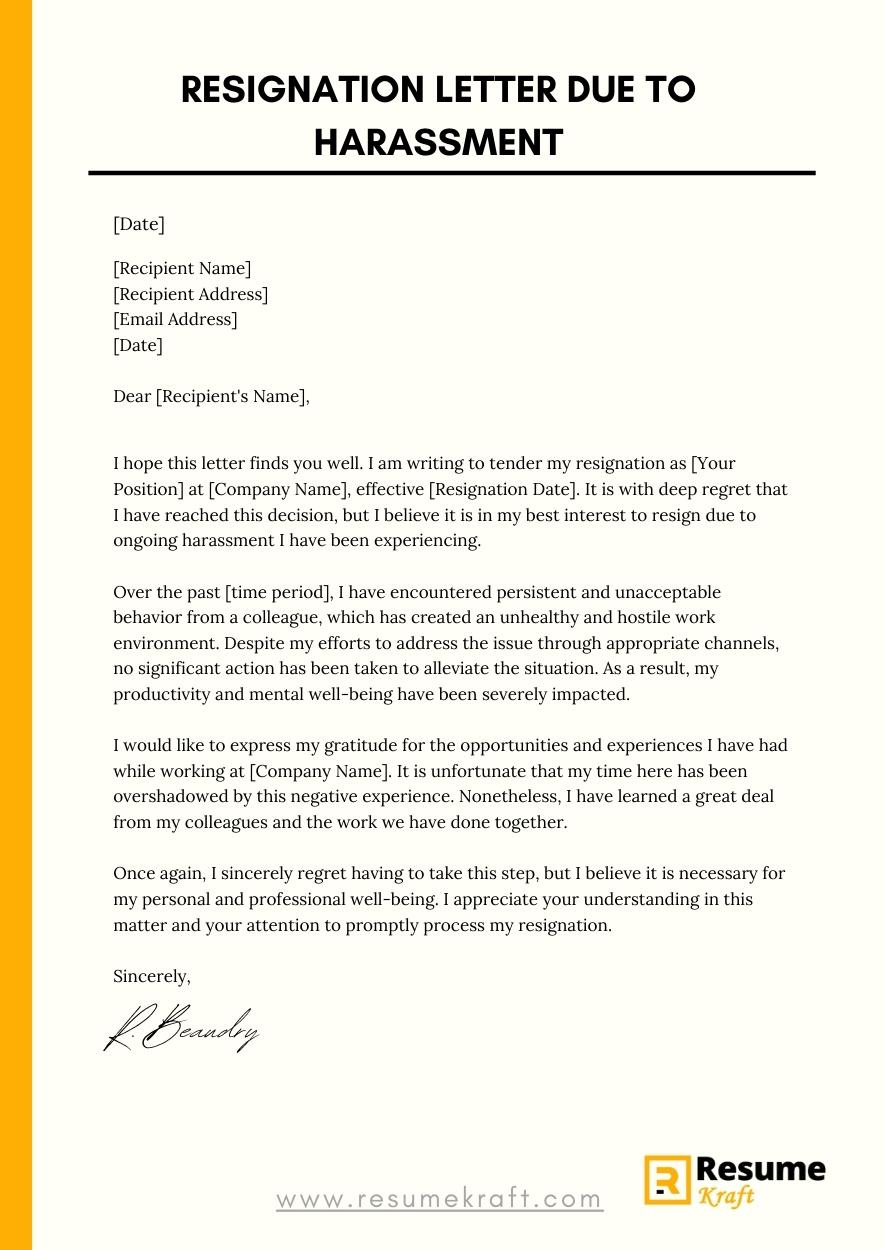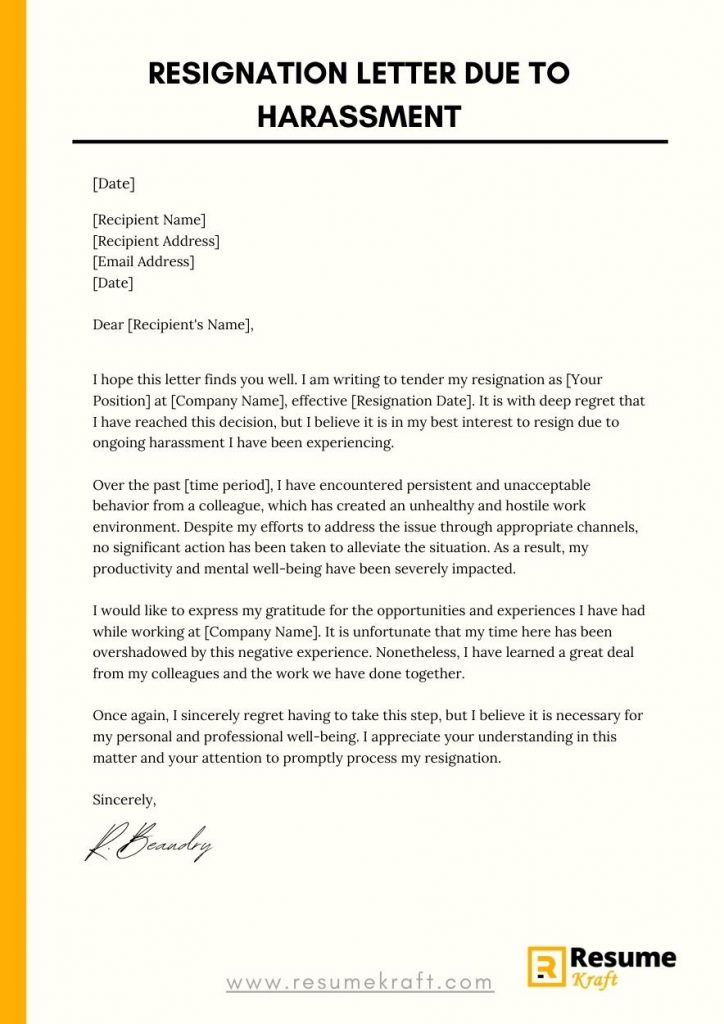
When faced with harassment in the workplace, it can be a challenging and distressing situation to navigate. If you find yourself in such a scenario, it may become necessary to resign from your job in order to protect your well-being and mental health. In this article, we will provide you with a comprehensive guide on how to write a resignation letter due to harassment. We will walk you through what to include, what not to include, and how to format your letter effectively.
In order to ensure the best quality content, we have tailored this guide specifically for those facing harassment in the workplace. We understand the sensitive nature of the issue and our aim is to support individuals who may be going through this challenging experience. As we present various resignation letter examples, we have also included a real person resignation letter sample to provide a practical and relatable reference.
What To Include in a Resignation Letter Due to Harassment
When writing a resignation letter due to harassment, it is important to maintain a professional tone and clearly communicate your reasons for resigning. Here are the key elements you should include:
1. Address the letter to your immediate supervisor or the appropriate authority:
Begin your resignation letter by addressing it to the person who needs to receive it. This is typically your immediate supervisor or the HR department.
2. Provide a clear and concise statement:
Clearly state your intention to resign due to harassment. Keep this statement brief and to the point, without going into unnecessary details. It is essential to communicate your reason without jeopardizing your future job prospects.
3. Specify the date of your resignation:
Include the specific date you intend for your resignation to be effective. This will allow your employer to make necessary arrangements and plan for your departure.
4. Express gratitude for the opportunities:
Regardless of the circumstances, it is essential to express gratitude for the opportunities and experiences you gained during your time at the company. This will help maintain a professional relationship and leave on a positive note.
5. Offer assistance in the transition:
If possible and appropriate, offer your assistance in transitioning your responsibilities to another employee. This shows your commitment to the organization even in your departure.
What Not to Include in Your Resignation Letter
While it is important to express your concerns and reasons for resigning, there are some things that should be avoided in your resignation letter:
1. Detailed accounts of the harassment:
Avoid providing a detailed account of the harassment incidents in your resignation letter. This is not the appropriate platform to lay out every detail, and focusing on the negative experiences could potentially harm your future job prospects.
2. Negative comments or blame:
It is crucial to maintain a professional and neutral tone in your resignation letter. Refrain from making negative comments or blaming any specific individuals for the harassment you have experienced.
3. Emotional language:
While it is natural to feel anger, frustration, or sadness, try to avoid using emotional language in your resignation letter. Stick to a professional tone and keep the focus on your decision to leave due to harassment.
4. Threats or ultimatums:
In your resignation letter, it is best to avoid making threats or issuing ultimatums. It is important to approach the situation with professionalism and act in accordance with legal protocols.
5. Personal opinions or judgments:
Avoid including personal opinions or judgments about individuals involved in the harassment. Maintain a neutral stance and focus solely on your own experience and decision to resign.
How To Format a Resignation Letter Due to Harassment
Formatting your resignation letter due to harassment should follow a professional and standard format. Here are some guidelines to help you structure your letter:
1. Your contact information:
Include your full name, address, phone number, and email address at the top of the letter.
2. Date:
Add the date when you are writing the letter beneath your contact information.
3. Employer’s contact information:
Beneath the date, provide the contact information of your immediate supervisor or the appropriate authority within your organization.
4. Salutation:
Begin your letter with a formal salutation, addressing the recipient by their appropriate title (e.g., “Dear Mr./Ms./Dr. [Last Name]”). If you are unsure about the specific recipient’s title, “Dear [Company Name] Human Resources” is acceptable.
5. Body of the letter:
In the body of the letter, clearly state your intention to resign due to harassment, as discussed earlier. Keep the letter concise and focused on the main points.
6. Closing:
End your letter with a formal closing, such as “Sincerely” or “Best Regards,” followed by your full name and signature.
7. Keep a copy:
Make sure to keep a copy of your resignation letter for your records.
Samples Resignation Letter Due to Harassment

Printed Resignation Letter Sample
Dear [Immediate Supervisor’s Name],
I hope this letter finds you well. I am writing to tender my resignation as [Your Position] at [Company Name], effective [Resignation Date]. It is with deep regret that I have reached this decision, but I believe it is in my best interest to resign due to ongoing harassment I have been experiencing.
Over the past [time period], I have encountered persistent and unacceptable behavior from a colleague, which has created an unhealthy and hostile work environment. Despite my efforts to address the issue through appropriate channels, no significant action has been taken to alleviate the situation. As a result, my productivity and mental well-being have been severely impacted.
I would like to express my gratitude for the opportunities and experiences I have had while working at [Company Name]. It is unfortunate that my time here has been overshadowed by this negative experience. Nonetheless, I have learned a great deal from my colleagues and the work we have done together.
During the transition period, I am committed to ensuring a smooth handover of my responsibilities. If there is anything I can do to assist in this process, please do not hesitate to let me know.
Once again, I sincerely regret having to take this step, but I believe it is necessary for my personal and professional well-being. I appreciate your understanding in this matter and your attention to promptly process my resignation.
I wish you and the entire team at [Company Name] all the best for the future.
Sincerely,
[Your Name]
Key Takeaways
- When writing a resignation letter due to harassment, maintain a professional tone and clearly state your intention to resign.
- Focus on your reasons for resigning and express gratitude for the opportunities and experiences gained during your time at the company.
- Avoid providing detailed accounts of the harassment, negative comments or blame, emotional language, threats or ultimatums, and personal opinions or judgments.
- Format your letter professionally, including your contact information, date, employer’s contact information, salutation, body of the letter, and closing.
- Keep a copy of your resignation letter for your records.
Frequently Asked Questions
Q: How should I handle the resignation process if I am facing harassment in the workplace?
A: Resigning from a job due to harassment is a sensitive situation. It is important to prioritize your mental health and well-being. Follow the steps outlined in this guide to write a professional resignation letter and ensure a smooth transition.
Q: Should I consult an attorney before resigning due to harassment?
A: It is advisable to consult with an employment attorney to understand your rights and legal options related to harassment in the workplace. They can provide guidance and support throughout the resignation process.
Q: Can I file a complaint of harassment before resigning?
A: Yes, you have the right to file a complaint of harassment with your employer or the appropriate authority before resigning. This can help document the issue and establish a record of your concerns.
Q: Should I include evidence of harassment in my resignation letter?
A: It is generally not recommended to include evidence of harassment in your resignation letter. Instead, keep the focus on your decision to resign and maintain a professional and concise tone.
Q: How can I ensure a smooth transition during the resignation process?
A: Offer your assistance in transitioning your responsibilities to ensure a smooth handover. Communicate with your employer and colleagues to ensure a seamless transition for all parties involved.
Conclusion
Resigning from a job due to harassment is a difficult decision to make. By following the guidelines and sample letter provided in this article, you can navigate this challenging situation with confidence and professionalism. Remember to prioritize your well-being, consult with the appropriate legal professionals if necessary, and always advocate for a respectful and healthy work environment.

